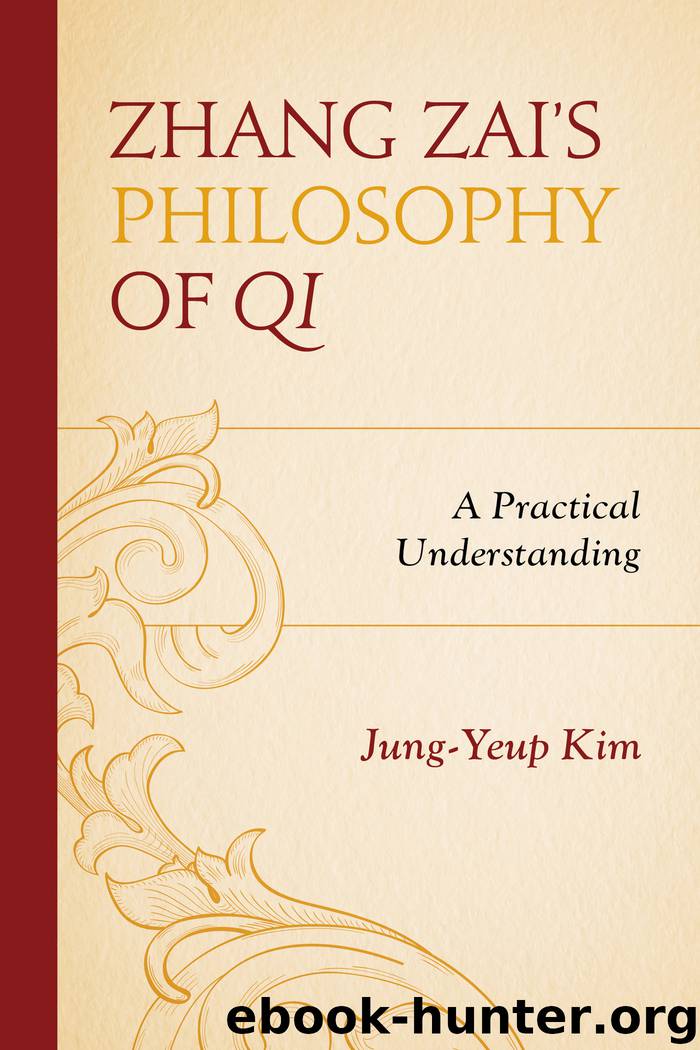Zhang Zai's Philosophy of Qi by Kim Jung-Yeup

Author:Kim, Jung-Yeup
Language: eng
Format: epub
Tags: undefined
Publisher: Lexington Books
Published: 2012-04-19T04:00:00+00:00
The reason I have students begin by studying ritual propriety is simply that by studying ritual propriety you can eliminate the common customs which, when they have become familiar habits, tangle and bind you. It is like being bound by an entangling vine; if you remove the entanglement you can ascend; ascending is the same as coherence (li 理) becoming manifest.[18]
For the Confucian, ritual propriety is mainly a set of fitting actions that are constituted by deferential patterns of conduct and shared cooperative activities practiced in the everyday and in ceremonies, which will nurture the disposition within us to avoid conflict and to create and sustain a felt vital coherence (li 理), that is, harmony, amongst ourselves. Thus, there is nothing essentially ascetic about Confucian ritual propriety, and rather the purpose of ritual propriety is aesthetic in nature. The initial inhibition of selfish impulses and behavior via the practice of ritual propriety allows us to positively connect with others, and doing so opens us up to a greater experience of shared fulfillment (cheng 成) and joy (le 樂) that cannot be obtained by isolated individuals.
It must be understood that the study of ritual propriety (xueli 學禮) mentioned in the above passage is not an abstract endeavor. Rather, the exercise of ritual propriety, while having many dimensions, primarily focuses on transforming our bodily comportment and dispositions in order to transform our feelings-and-thoughts.[19] In the Confucian non-
dualistic view of the body and heart-mind, there is an internal relationship between the cultivation of our bodily behavior and the cultivation of our heart-mind. In discussing the topic of cultivating one’s body via ritual propriety, Chaibong Hahm argues that “to cultivate the body is to cultivate the mind” (Hahm 2001, 318).[20] Also, in her discussion of the central role of the body in moral self-cultivation as understood in classical Confucianism and Zhang Zai, Robin R. Wang argues that for Zhang Zai, “The transformation of qi-quality and rectification of the heart/mind are complimentary (Zhang 1978: 275). This transformation/rectification results from the removal of past improper behaviors, submitting to rituals, and succeeding in perfecting qi-quality over time.”[21]
Thus, from the Confucian perspective, to comport our bodies, behave, and speak in deferential and cooperative ways will nurture a disposition to feel-and-think in terms of avoiding conflict, and creating as well as sustaining a felt vital harmony amongst ourselves. Thus, Zhang Zai asserts: “The relation between the transformation of bodily dispositions and emptying one’s heart-mind (of the four modalities) is that of the reciprocity of the outer and inner” (變化氣質與虛心相表裏, 274); “The way of the exemplary person is to consider achievement as consummating the lived body and consummating the capacity to resonate” (君子之道,成身成性以為功者也, 27); and “If one reaches the vastness of nature, the capacity for resonance is consummated and the lived body is consummated” (大達於天,則成性成身矣, 34). Hence, for him, the conditions that constrict our experience, namely, our bodies, can also function to allow us to expand our experience if cultivated properly. That is, he argues that “after there is physical form there are bodily dispositions.
Download
This site does not store any files on its server. We only index and link to content provided by other sites. Please contact the content providers to delete copyright contents if any and email us, we'll remove relevant links or contents immediately.
| Anthropology | Archaeology |
| Philosophy | Politics & Government |
| Social Sciences | Sociology |
| Women's Studies |
The remains of the day by Kazuo Ishiguro(8977)
Tools of Titans by Timothy Ferriss(8365)
Giovanni's Room by James Baldwin(7330)
The Black Swan by Nassim Nicholas Taleb(7109)
Inner Engineering: A Yogi's Guide to Joy by Sadhguru(6785)
The Way of Zen by Alan W. Watts(6601)
Asking the Right Questions: A Guide to Critical Thinking by M. Neil Browne & Stuart M. Keeley(5759)
The Power of Now: A Guide to Spiritual Enlightenment by Eckhart Tolle(5754)
The Six Wives Of Henry VIII (WOMEN IN HISTORY) by Fraser Antonia(5498)
Astrophysics for People in a Hurry by Neil DeGrasse Tyson(5182)
Housekeeping by Marilynne Robinson(4436)
12 Rules for Life by Jordan B. Peterson(4299)
Double Down (Diary of a Wimpy Kid Book 11) by Jeff Kinney(4261)
Ikigai by Héctor García & Francesc Miralles(4247)
The Ethical Slut by Janet W. Hardy(4242)
Skin in the Game by Nassim Nicholas Taleb(4239)
The Art of Happiness by The Dalai Lama(4125)
Skin in the Game: Hidden Asymmetries in Daily Life by Nassim Nicholas Taleb(3991)
Walking by Henry David Thoreau(3953)
